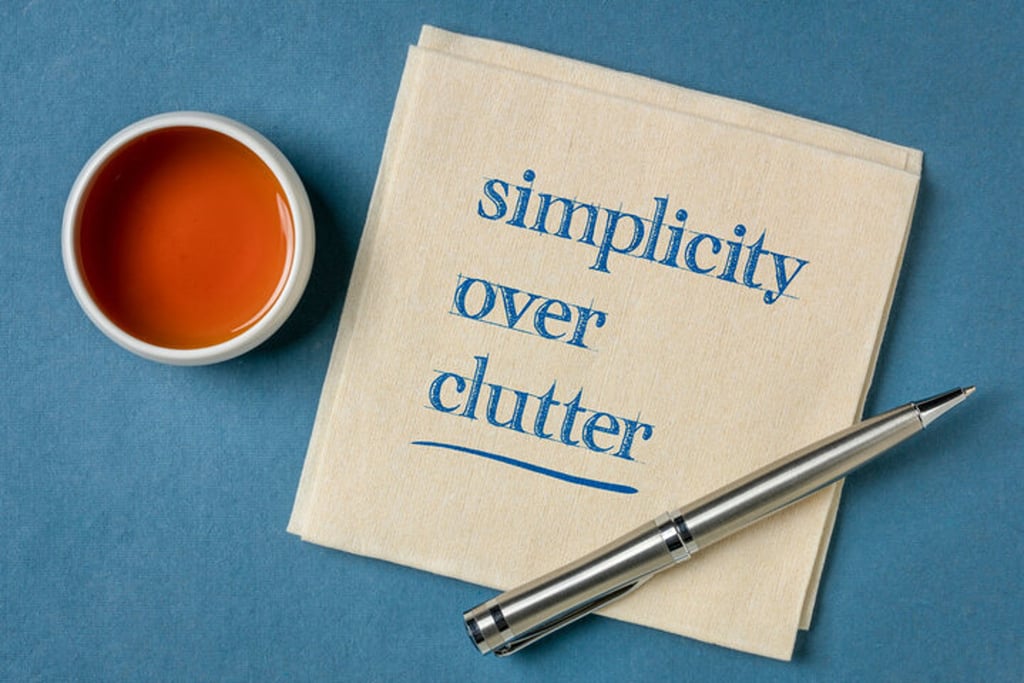“Clutter,” The Silent Stressor - It’s Hidden Weight and How to Lighten It
HEALTH AND WELLNESS
Tarun Mehta
10/10/20254 min read


“Clutter,” The Silent Stressor - It’s Hidden Weight and How to Lighten It
Introduction: More Than Just “Stuff”
Picture this: your desk is covered with papers you promised to sort, pens scattered in every direction, a mug or two you never returned to the kitchen. Or maybe your kitchen counter has turned into a collection zone for keys, mail, reusable bags, and gadgets you forgot you owned. And then there is the infamous “junk drawer”, a place that seems to swallow every odd battery, receipt, and screwdriver.
We often tell ourselves it is “just stuff.” But if it is only stuff, why does it feel so heavy? Why does opening that drawer or seeing that cluttered counter, spark a sigh?
The truth is that clutter is not only about what is visible. It reaches deeper, affecting focus, mood, and even the way we make decisions. Understanding why clutter gathers, how it influences daily life, and what small shifts can break the cycle opens the door to both a lighter space and a lighter mind.
Why Clutter Accumulates: The Psychology Behind It
Clutter does not pile up overnight. It sneaks in quietly, shaped by small choices and bigger emotions:
Deferred micro-decisions
We often tell ourselves; I will put it here just for now. A bill goes on the table, a jacket lands on a chair, a shopping bag sits in the hallway. Each time we delay a tiny decision, the pile grows a little larger.Sentimental attachment
Objects hold memories. A gift from a friend, a shirt worn on a special day, or a souvenir from a trip feels like more than an item, it feels like a piece of life. Letting go can feel like letting go of the memory itself, even though the memory lives within us.Scarcity mindset
A common thought creeps in: What if I need this someday? That extra cord, old manual, or unused appliance feels like a safety net. The fear of not having it “just in case” convinces us to keep it, even if years pass without use.Mental overload
Clutter is not only the cause of stress, it can also be the symptom. During busy or overwhelming times, energy for tidying fades. Items pile up not because we do not care, but because our minds are already juggling too much.
How Clutter Impacts Your Life
It is easy to brush clutter aside, thinking it is harmless. Yet, research and experience show it shapes our minds and emotions in powerful ways.
Cognitive load
Our brains process what we see. A messy desk does not just sit there, it pulls focus. Even when we are not directly looking at it, the visual noise demands attention, leaving us more easily distracted and mentally tired.Stress signals
A cluttered room quietly whispers of “unfinished business.” The sight of scattered papers or laundry hints at tasks waiting for us, which creates subtle tension and unease.Productivity drain
Have you ever spent 15 minutes hunting for keys, chargers, or that one document? Clutter costs time and causes frustration. It interrupts flow and steals energy that could go toward meaningful tasks.Emotional weight
Clutter can stir up guilt about what we have postponed, frustration over lost time, or even a sense of being “stuck.” These feelings do not always shout, but they hum in the background, shaping mood and motivation.
Everyday Behaviors That Lead to Clutter
Clutter rarely comes from one big mistake; it is often the sum of everyday habits.
Dropping items in random spots. Mail, bags, coats, and receipts land where it is convenient, not where they belong.
Buying “just in case.” A second blender, an extra set of pans, or that sale item that seems too good to pass up can end up unused.
Lack of a home. If an item does not have a clear place to live, it floats. And floating items often multiply.
Digital clutter. Thousands of unread emails, endless notifications, and messy files are the modern version of piles on the desk. They weigh on the mind even if they do not take physical space.
Small Shifts to Break the Cycle
Clearing clutter does not mean tackling your entire house in one heroic weekend. Gentle, steady steps create lasting change. Here are some practical ways to get started:
The one-minute rule
If something takes less than a minute, like hanging a coat, filing a paper, or putting a glass in the sink, do it right away. Small actions prevent small piles from growing.The “home” method
Every item deserves a designated spot. Keys by the door, scissors in a drawer, chargers in a basket. When everything has a home, tidying becomes easier and faster.Daily reset ritual
Spend 5-10 minutes each evening resetting your space. It could mean clearing the kitchen counter, folding a blanket, or sorting the mail. A short, consistent routine builds order without overwhelming effort.Declutter in micro-zones
Instead of aiming to organize the entire garage or closet, start with one drawer or shelf. Small wins build momentum and make the process feel encouraging rather than exhausting.Digital declutter
Set a weekly ritual: unsubscribe from emails you never read, delete files you no longer need, or archive old photos. Digital space matters just as much as physical space.
Reframing Clutter as Personal Growth
Here is something important: clutter does not mean failure. It means feedback. It signals that something in your environment or routine needs adjusting.
Feedback, not flaw. A cluttered desk might show that your system for handling papers needs refining, not that you are disorganized as a person.
Letting go builds resilience. Releasing items helps practice the art of trust - trust that memories stay without objects, and trust that you can handle future needs without stockpiles.
Clear spaces as self-respect. A tidy environment is not about perfection. It is about creating a space that supports calm, clarity, and care for yourself.
When you view decluttering as growth instead of a chore, the process becomes lighter and even empowering.
Closing: Start Small, Feel the Shift
Clutter may look like simple piles of “stuff,” but it holds weight far beyond the physical. It shapes focus, influences mood, and affects how we move through the day. The good news is that every small step makes a difference.
Choose one drawer, one corner, or one digital folder today and give it a reset. Notice how it feels.
Every item you clear is one less decision weighing you down. With each small shift, you are not just tidying a space, rather you are creating more room for clarity, energy, and peace.
Video available at: https://youtu.be/vY1D8cd9AlE

Ascend2Elevate
Transform today, Thrive tomorrow
© 2026. All rights reserved.
PS: The content on the website are the author's viewpoint and opinion. Kindly follow any tips or advice at your own discretion and ensure they suit your needs and personal situation. Please check our T&C page for more details (ascend2elevate.com.au/terms-and-conditions)
Office 4074, Ground Floor, 470, St Kilda Rd, Melbourne, VIC-3004, Australia
